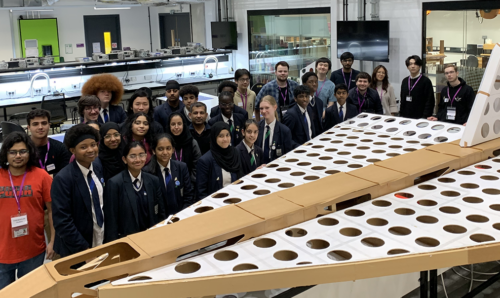Manchester, City of Science at ESOF 2016
Research impact 11 August 2016
 ‘Science as revolution’ was the theme of the EuroScience Open Forum (ESOF) held in Manchester last month, and the event did not disappoint to live up to its exciting billing. As both the World’s first industrialised city and the place where graphene was first isolated, Manchester felt like the perfect setting for the conference.
‘Science as revolution’ was the theme of the EuroScience Open Forum (ESOF) held in Manchester last month, and the event did not disappoint to live up to its exciting billing. As both the World’s first industrialised city and the place where graphene was first isolated, Manchester felt like the perfect setting for the conference.
ESOF 2016, hosted at Manchester Central, took place over four days in late July and featured a number of high profile speakers including Carlos Moedas, Brian Schmidt and Sir Venki Ramakrishnan. Science and Engineering at Manchester was well represented throughout the week, with a number of keynote sessions and talks from members of our academic staff.
In conversation with our researchers
Professor Brian Cox spoke ‘in conversation’ with Matthew Cobb – Professor of Zoology at the University – to give a light-speed overview of the fields of cosmology and astrophysics, touching upon inflation theory, cosmic background radiation and the first moments of the Universe.
Questions from the large audience who had gathered to see Brian talk threw up some interesting topics for discussion including public engagement in science, social mobility issues in higher education and the BBC.
 The next day, Nobel Prize winning physicist Professor Sir Andre Geim sat down with John Lloyd – from Blackadder and QI producer fame – to muse over an eclectic range of topics together from life in the Soviet Union to levitating frogs.
The next day, Nobel Prize winning physicist Professor Sir Andre Geim sat down with John Lloyd – from Blackadder and QI producer fame – to muse over an eclectic range of topics together from life in the Soviet Union to levitating frogs.
Professor Geim commented that his current research interests had now moved on from graphene to other 2d materials, and how combinations of these could create the designer materials of the future.
Our strong industrial partnerships
Such designer materials will be required to meet the societal demands of a growing world population over the next hundred years, with these issues being hotly debated by a panel of leading industrial thought leaders at the ‘Materials Challenges for the 21st Century’ session.
The panel featured Dr Robert Sorrell – Associate Director of the BP International Centre for Advanced Materials headquartered in Manchester – who spoke about how BP’s strong ties with the University allow them to create new and improved materials for the energy sector by understanding the fundamental science which underpins processes such as corrosion and hydrogen embrittlement.
BP’s Chief Scientist and Manchester alumni, Dr Angela Strank, took part in an inspirational panel debate on the topic of women in science. Dr Strank spoke about her own experiences of discrimination and how she overcame it, as well as using the concept of ‘science capital’ to inspire people of all ages and background to engage with science and technology.
“We have to tackle misconceptions about women in engineering and science we are told are embedded in children from as young as seven years old,” urged Dr Strank.
From Manchester to the Middle East
Professor Philip Withers showcased the University’s unique collaboration with Diamond Light Source, the UK’s national synchrotron science facility located at the Harwell Science and Innovation Campus in Oxfordshire – which uses high energy x-rays to understand and extend the behaviour of materials.
The same technology can also act as a beacon for transnational peace, as the Synchrotron-Light for Experimental Science and Applications in the Middle East project demonstrates.
Speakers from a number of different nations and organisations, including HRH Princess Sumaya bint El Hassan of Jordan, came together at ESOF to explain how the Arab-Israeli-Iranian-Turkish-Cypriot-Pakistani collaboration (trying saying that after a few cups of arak!) will not only deliver cutting-edge science but also help work towards a peaceful future for the Middle East.
Our evolving scientific story
“All scientists will always be welcome in Manchester,” said Vice-Chancellor Dame Nancy Rothwell during the official ESOF closing ceremony, before the honour of European City of Science was handed over to 2018 host Toulouse.
ESOF showcased our pioneering research on a European stage and marked the start of the next chapter in Manchester’s evolving scientific story.




